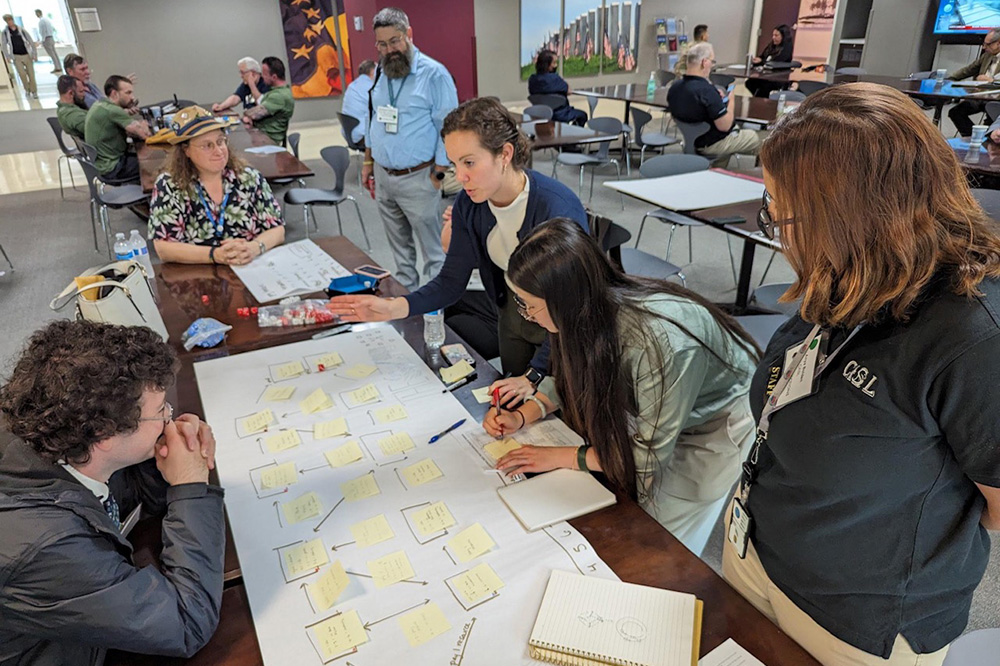Initially an athletic training major, Elizabeth “Betsy” Joslyn ’14 switched majors to applied chemistry in 2013. After graduating the following year, Joslyn’s journey led her not to the conventional laboratory setting but to the captivating realm of wargaming.
It should come as no surprise that wargames have their roots in history. Traditional wargames—strategy games in which two or more players command opposing armed forces in a realistic simulation—cover famous historical battles and military organizations. Many wargamers recreate whole wars, including the campaigns, battles and low-intensity combats within them.
As a Senior Joint Military Operations and Wargaming Analyst in the Joint Advanced Wargaming Division of the Institute for Defense Analyses (IDA), Joslyn has discovered a synergy between her science background and the tapestry of wargaming. Her role is to design wargames for the military, but it involves a massive behind-the-scenes effort to design, build, explore and analyze wargames and warfighting concepts to train and educate others. Her game research and design has largely focused on great power competition, distributed logistics and risk literacy.
“Wargaming is similar to the same line of thinking as the scientific method where you make an observation, design your research questions, formulate a hypothesis, gather data and explore the implications of the results. Although the scientific method is applied in a much more replicable and precise fashion, wargaming analysis uses the same logic pattern,” Joslyn says.
After her graduation from Bridgewater, Joslyn spent two years in the Peace Corps as a rural aquaculture specialist where she used her coursework knowledge to study and improve environments in rural Zambia for fish farming. After returning to the U.S., she worked for the Department of Transportation as an executive assistant before being promoted to a congressional liaison position. It was in this role that Joslyn learned she loved public service and decided to apply for graduate school at American University in Washington, D.C., to pursue a master of science in terrorism and homeland security policy.
“It was through chemistry that these doors opened up, and I had the opportunity to attend grad school,” Joslyn says. “Although chemistry was not part of my terrorism-related studies, the program definitely required logic, rigor and evidence-based thinking on a scale I had only encountered from my chemistry days at Bridgewater.”
After completing her graduate studies in 2021, Joslyn joined the professional field of wargaming. She had experience playing traditional wargames such as Empires of the Sun with her father and brothers—a historically uncommon hobby for women. According to a survey by Wargames, Soldiers and Strategy in 2019, the estimated makeup of women in wargaming as a hobby was between 1.5-2%.
Joslyn also serves as the Head of Programming for the Women’s Wargaming Network of D.C. “More women are becoming game designers in the commercial world. More women are playing commercial games, and, as a result, we’re getting more women interested in the professional field of wargaming.”
“It’s a great time to be a nerd,” Joslyn says. Beyond gameplay, Joslyn loves bringing people together: connecting young people with a hobby to the professional wargaming world and finding ways to incorporate lessons learned from the older generation of wargamers with new ideas from the current players.
“Every day, I look at the work we wargamers produce as a community in both the commercial and professional fields and ask, ‘How can we take this and make it better? How can we literally pull more chairs up to the game table and get more people sitting here? How can we make our methods more rigorous, while boosting the well-known educational component that games bring to the room?’” Joslyn says.
“These questions present such amazing opportunities for the field, and I’m so excited to see what the community will accomplish in the future.”
Game Time
A highly accessible game that is easy to learn and can be played in under one hour, Turning Tides is designed to demonstrate competing interests between powers to reduce global greenhouse gases at a geopolitical level. Gameplay requires a printer (see Joslyn’s post on PAXsims for instructions and all cards needed to play), a six-sided die and a pencil.
“A microgame is a very small component that can be played on a piece of paper, essentially. A game should be engaging and stick with people, so they walk away from the table remembering that experience. It’s a great way to learn,” Joslyn says.
– Logan Bogert


